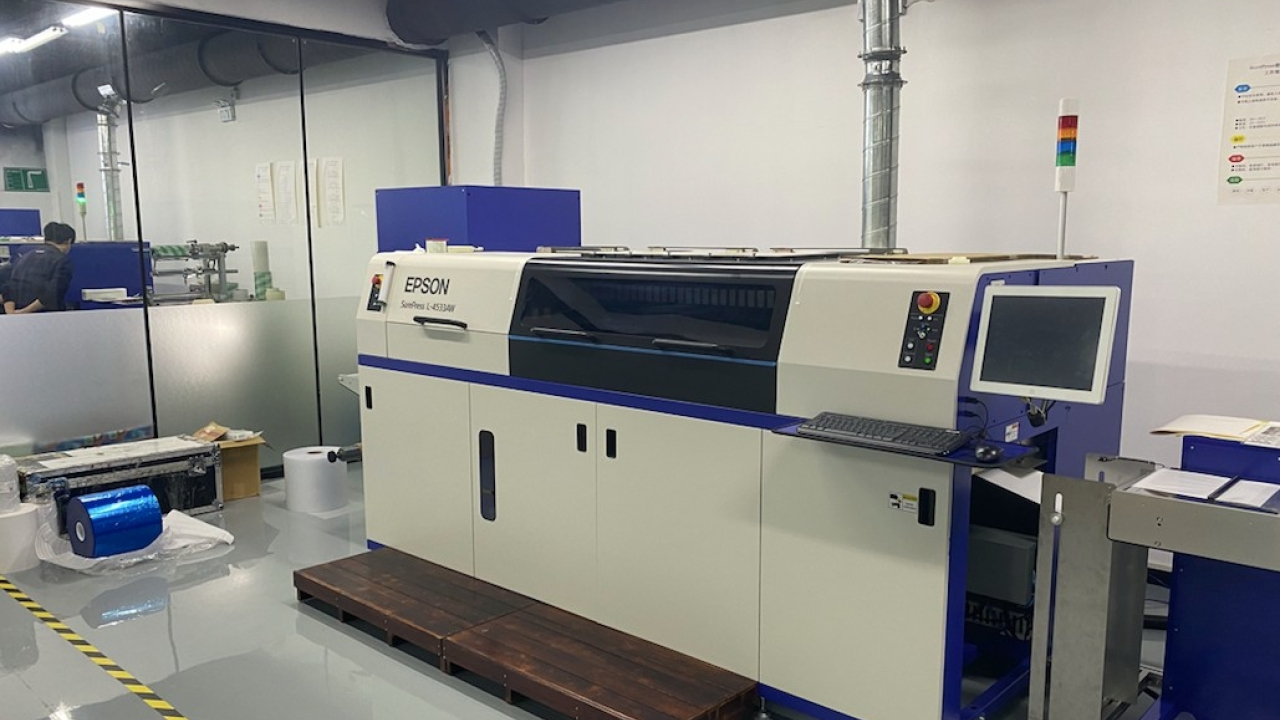Huangjin eyes digital future

Riding on the increasing popularity of digital printing and an increase in short run orders, Huangjin purchased an Epson SurePress L-4033AW in 2015 and an Epson SurePress L-4533AW in 2019, accelerating the company’s digital focus. Today digitally printed labels at Huangjin account for 30-40 percent of its business.
Qi Shipeng, GM of Huangjin, says the decision to purchase the first aqueous inkjet Epson press was made after ‘an investigation of almost all the digital printing technologies on the market at that time’. The L-4033W press uses Epson’s own patented Micro Piezo inkjet head technology and a 7-color aqueous ink set.
‘We chose this aqueous inkjet technology for four reasons,’ Qi explains. ‘First, environmental friendliness. The Chinese government’s environment protection regulations at that time were not as stringent as now, but as a responsible manufacturer we had already made great exertions to reduce environmental pollution and waste from our daily production.
Whether talking about the machine itself or the ink, the Epson digital press conforms to EU RoHS rules; it can reduce the use of chemicals and volatile organic solvents.
‘Second, it can produce highly saturated colors with an extremely wide color gamut, which will facilitate color matching with conventional letterpress, guarantee color conformity and provide more printing choice for customers.
‘Third, digital printing reduces human intervention during operation, which is good for color control in different production batches over different times making color more stable.
‘Fourth, the press can handle an extensive range of materials without any pre-printing treatment. The surface exhibits excellent adhesion and scratch resistance, so the labels produced are delicate, beautiful and durable.
‘Without a doubt the longstanding brand awareness and reputation of Epson in the printing market and its patented inkjet head and ink technology impressed us most, and was at the center of our cooperation,’ concludes Qi Shipeng.
As its digital printing business continued to grow, in 2019 Huangjin bought its second aqueous inkjet press, an Epson SurePress L-4533AW. ‘By this point one press was insufficient to handle our digital print requirements,’ recalls Qi Shipeng. ‘What’s more, the Epson SurePress L-4533AW demonstrated huge improvements in output and operational performance compared to the previous 4033AW series.’
The culmination of these investments, to Huangjin’s immense pride, was winning first prize in the Wine and Beer digital label category and second prize in the Liquor digital label category of the Packaging Impressions Excellence Awards 2019.
Digital vs conventional
At present, Huangjin continues to develop both conventional and digital printing simultaneously. ‘For each label order, we comprehensively consider its quantity, materials costs, production process and lead time, among other factors, and then select the most appropriate printing method.
‘Digital printing is in fact a good supplement to conventional printing. Overall, both digital printing and conventional printing meet the requirements of certain market segments and will exist side by side for a long time. Of course, individual label converters will have a different mix of sales, quotations and end user marketing and customer groups, so the two printing technologies will have difference emphases, or will develop differently. There is no doubt that the Covid-19 epidemic has sped up the pace of digital technology adoption in the label printing industry.’
Today overseas export orders at Huangjin account for some 20 percent of business. After the Covid outbreak, domestic orders were basically at the same volume as last year, but overseas orders unsurprisingly suffered. Luckily, this lost business was made up by newly added orders for epidemic prevention materials.
For Qi, the pandemic impacted all industries and he believes there will be long-term changes to the label industry as a result. ‘Surviving companies will take the opportunity to make disaster recovery preparations beforehand and will have a long-term development plan.’
At Huangjin, for example, this means an intention to increase investment in digital printing and the purchase of another Epson machine this year. This will be a SurePress L-6534VW UV inkjet press and the investment will include a digital die-cutting system. In the future, digital printing will become the core of Huangjin.
Stay up to date
Subscribe to the free Label News newsletter and receive the latest content every week. We'll never share your email address.


